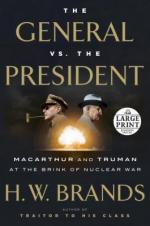- Books
- May We Suggest
- MILITARY ART
- soldiers
- PLACE ATTACHMENT
- NEIGHBORHOODS
- CANCER
- DEATH AND DYING
- NEUROSURGEONS
- WOMEN MATHEMATICIANS
- ROCKERTY
- 1950s
- Dwight D. Eisenhower
- Harry S. Truman
- Douglas MacAuthur
- Biography
- History
February 3, 2017 | madame librarian
Expand your mind. What's it like to go to war? Why do Americans move so frequently? A brilliant neurosurgeon learns he has inoperable cancer, read how he decides to meet this challenge. Women 'rocket sciences'? Yes!
The average restless American will move 11.7 times in a lifetime. For Melody Warnick, it was move #6, from Austin, Texas, to Blacksburg, Virginia, that threatened to unhinge her. In the lonely aftermath of unpacking, she wondered : Aren't we supposed to put down roots at some point? How does the place we live become the place we want to stay? This time, she had an epiphany. Rather than hold her breath and hope this new town would be her family's perfect fit, she would figure out how to fall in love with it-- no matter what. How we come to feel at home in our towns and cities is what Warnick sets out to discover.
"From master storyteller and historian H.W. Brands, twice a finalist for the Pulitzer Prize, comes the riveting story of how President Harry Truman and General Douglas MacArthur squared off to decide America's future in the aftermath of World War II. At the height of the Korean War, President Harry S. Truman committed a gaffe that sent shock waves around the world. When asked by a reporter about the possible use of atomic weapons in response to China's entry into the war, Truman replied testily, 'The military commander in the field will have charge of the use of the weapons, as he always has.' This suggested that General Douglas MacArthur, the willful, fearless, and highly decorated commander of the American and U.N. forces, had his finger on the nuclear trigger. A correction quickly followed, but the damage was done; two visions for America's path forward were clearly in opposition, and one man would have to make way. Truman was one of the most unpopular presidents in American history. Heir to a struggling economy, a ruined Europe, and increasing tension with the Soviet Union, on no issue was the path ahead clear and easy. General MacArthur, by contrast, was incredibly popular, as untouchable as any officer has ever been in America. The lessons he drew from World War II were absolute: appeasement leads to disaster and a showdown with the communists was inevitable--the sooner the better. In the nuclear era, when the Soviets, too, had the bomb, the specter of a catastrophic third World War lurked menacingly close on the horizon. The contest of wills between these two titanic characters unfolds against the turbulent backdrop of a faraway war and terrors conjured at home by Joseph McCarthy. From the drama of Stalin's blockade of West Berlin to the daring landing of MacArthur's forces at Inchon to the shocking entrance of China into the war, The General and the President vividly evokes the making of a new American era"--.
In the 1940s and 50s, when the newly minted Jet Propulsion Laboratory needed quick-thinking mathematicians to calculate velocities and plot trajectories, they recruited an elite group of young women -- known as human computers -- who, with only pencil, paper, and mathematical prowess, transformed rocket design, helped bring about the first American ballistic missiles. But they were never interested in developing weapons, their hearts lay in the dream of space exploration. So when the JPL became part of a new agency called NASA, the women worked on the first probes to the moon, Venus, Mars, and beyond. Later, as digital computers largely replaced human ones, JPL was unique in training and retaining its brilliant pool of women. They became the first computer programmers and engineers, and through their efforts, we launched the ships that showed us the contours of our solar system. Rise of the Rocket Girls tells the stories of these women who broke the boundaries of both gender and science.
At thirty-six, on the verge of completing a decade's worth of training as a neurosurgeon, Paul Kalanithi was diagnosed with stage IV lung cancer. One day he was a doctor treating the dying, and the next he was patient struggling to live. And just like that, the future he and his wife had imagined evaporated. His exquisitely observed memoir chronicles Kalanithi's transformation from a naive medical student into a neurosurgeon at Stanford, and finally into a patient and new father confronting his own mortality..
'Grunt' tackles the science behind some of a soldier's most challenging adversaries-- panic, exhaustion, heat, noise-- and introduces us to the scientists who seek to conquer them.





